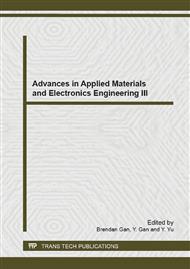p.585
p.591
p.595
p.600
p.611
p.615
p.619
p.623
p.627
Multiuser Detection with Delay Feedback Scheme for Asynchronous Cooperative Networks
Abstract:
The transmission antennas in cooperative systems are spatially distributed on multiple nodes, so the received signal can be asynchronous due to the propagation delays. In this paper, we propose a novel feedback mechanism for cooperative relay networks to improve the performance by increasing the forwarding delay. In contrast to a previous work by the authors, where the performance is poor for small delay, the proposed feedback scheme in amore attractive scenario where the destination can deal with any delay with the better performance. Simulation results illustrate the performance of the proposed scheme in comparison with forward and backward interference cancellation (FBIC) scheme without feedback. Finally, we demonstrate that the greater the delay, the more obvious advantages of the algorithm complexity than bounded delay tolerant Alamouti codes (BDT-AC).
Info:
Periodical:
Pages:
611-614
DOI:
Citation:
Online since:
April 2014
Authors:
Price:
Сopyright:
© 2014 Trans Tech Publications Ltd. All Rights Reserved
Share:
Citation:


